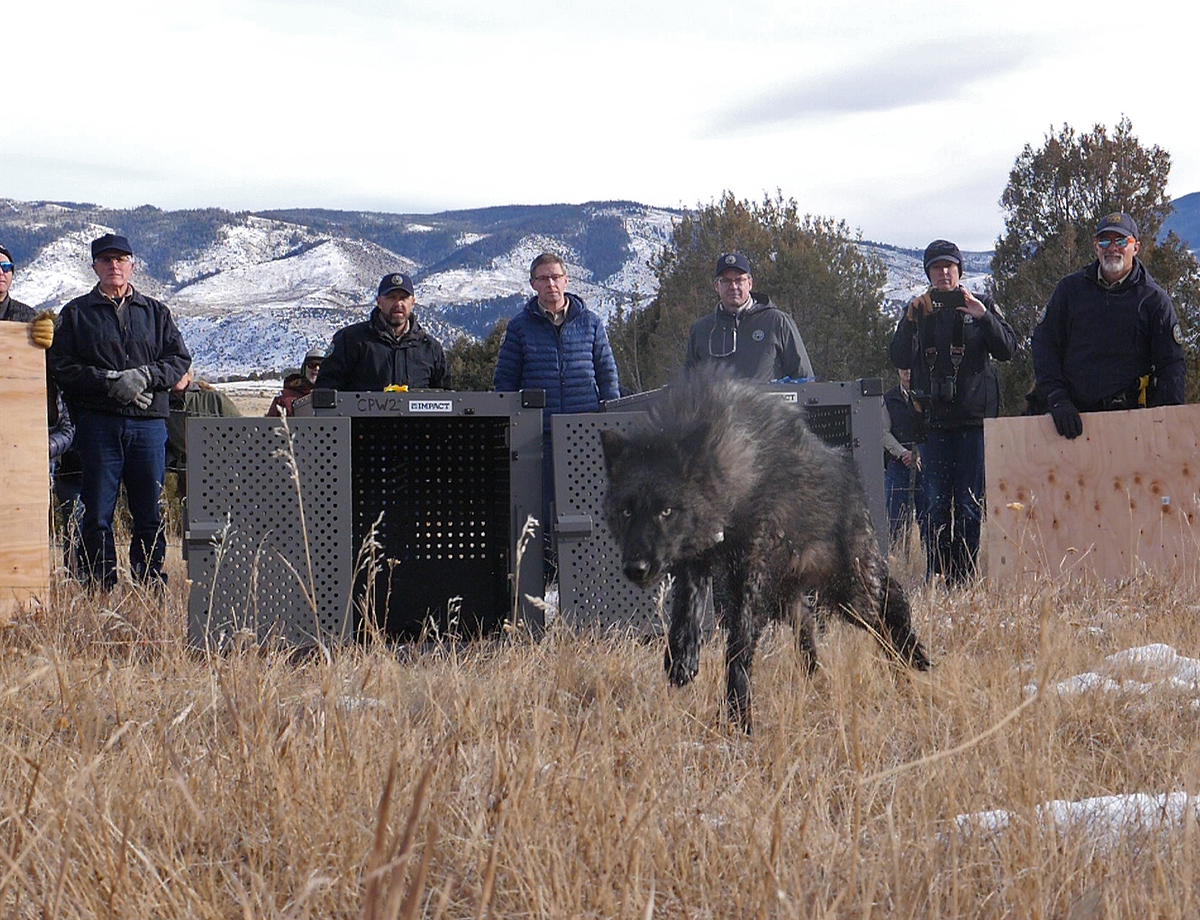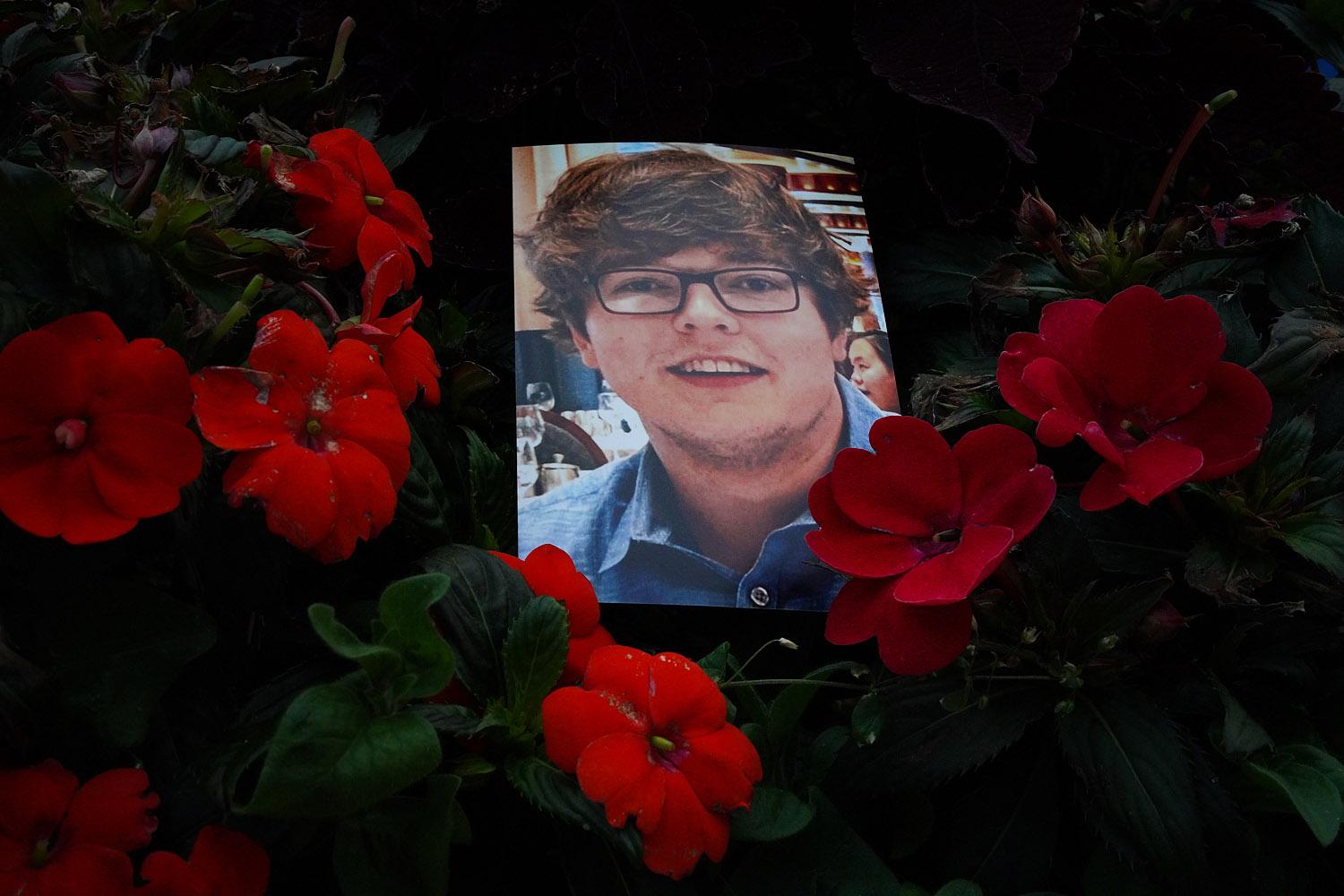
 Troy Riggs, Denver's new director of public safety, will oversee all the city’s law enforcement agencies, its fire department and jails. He was previously the deputy director of the department.
Troy Riggs, Denver's new director of public safety, will oversee all the city’s law enforcement agencies, its fire department and jails. He was previously the deputy director of the department.
Riggs had been the police chief and director of public safety in Indianapolis earlier in his career. He spoke with Colorado Matters about issues including police shootings, and abuse cases that have occurred in the Denver Jail, and what will differentiate his approach to his predecessor, Stephanie O’Malley.
Read The Transcript
Nathan Heffel: Relationships are very important to Troy Riggs. He's Denver's new Director of Public Safety. Riggs says he came to Colorado in part because of a chance to build a relationship with Mayor Michael Hancock. He has also had a longstanding relationship with Denver Police Chief Robert White, which is a matter of concern for some looking at an ongoing investigation in the police department. But Riggs says the most important relationship he wants to develop is with the city's communities. Director Riggs, welcome to Colorado Matters. Troy Riggs: Thank you for having me. NH: To start, Denver's Department of Public Safety oversees the city's law enforcement agencies, fire department and jails. However, you didn't come to Denver for that job but rather the city's Chief Operating Officer. That was in November. How did those first months help you prepare for your move to this current position? TR: Well, it really did prepare me. I had some opportunities throughout the nation but after hearing speeches from Mayor Hancock, meeting him personally, I knew I wanted to be a part of Team Hancock because I saw his belief in good government and his belief in helping citizens. There was a chief operating officer position they were putting together. I came here. I was able to really look at all the strategic plans for all the different departments, focused a lot of time on the sheriff reform efforts and seeing the changes they're making and the progress they've made over the last few months. But then I sat down and met with every individual within our staff. I met with various employees and I was in the community a great deal for those first three months as well. NH: When you came in, was there no indication or expectation really that you would eventually move from COO to Director of Public Safety? TR: No, I had had a conversation with Mayor Hancock and he knew I was being recruited other places. But I really wanted to be in this city and I want to be a part of his team long term so I didn't really care where I landed quite frankly. I just wanted to be part of his team and the Chief Operating Officer of Public Safety was really a good spot for me. NH: There are parts of the community who look at issues like police shootings or abuse cases that have occurred in the Denver jail and they don't seem to be on the same page with city officials when it comes to public safety. What will differentiate your approach in trying to get everyone on the same page? TR: Well, I think if they'll look at we've done over the last three months I've been here with the reform efforts and the sheriff's department and Sheriff Firman and the leadership that he's really been given and the new team he's put in place, they're going to see some massive changes that's taking place now but they're going to see the sheriff's department move from reform to being very proactive, especially with dependency issues, reentry issues, use of force issues. We just had that conversation the other day. But for those individuals that are concerned about the sheriff's department, I think the sheriff and I and the mayor, we understand that. There have been issues in the past. That's why there's been a great reform effort that's taking place. I want to hear those concerns. I want to listen to them. If there's something that we're not doing well, it's our responsibility in leadership to improve that and the only way we can improve it is by listening to individuals and some of the individuals we need to listen to are those that have been incarcerated and have been released. We can learn a great deal from them as well. NH: So those voices that may not have been heard in the past you're hoping to step up and really talk to them. TR: Absolutely. You'll see one of the big pushes that I have is we need to be in the community more as the Department of Safety. We need to listen, not only just to the people patting us on the back, but those that have criticism. I've already told our staff for some people that may be malicious in their criticism, we still need to listen because there's usually a shred of truth in there somewhere that will help us improve and we owe that to the citizens of Denver. NH: I think of people that may not even know that your department exists and what it is. They just see what you oversee. TR: Right. The Department of Safety is 4,400 individuals. It's $540 million investment that this city has made and Mayor Hancock has made in Public Safety and that deals with everything from police services to reentry throughout the jail, people leaving and a lot of health issues that the fire department has to deal with on a daily basis. NH: Your background is in police work. You were on the force in Louisville, Kentucky. You were police chief in Indianapolis, Indiana. Your predecessor here, Stephanie O'Malley, was a lawyer. Help us understand where the lines are drawn when it comes to your earlier jobs and this new one. TR: Well, I've also been an assistant city manager over public health and safety and I've been a director of public safety over something very similar in Indianapolis to here in Denver. I have that experience as well. A long time ago I worked in the county judge-executive office helping oversee all operations. I have a lot of operational experience. But Stephanie O'Malley had a great deal of legal experience and there has to be a balance. So I tell people all the time there's not one person that's smart enough to do this job. It's very difficult, very complex. You're dealing with people every day. You're dealing with some of the tremendous issues that we're grappling with as a nation, and I have to rely on a team around me. So we have a very good team and I'll have to say I've never seen an executive office that has so much talent and Stephanie O'Malley needs to be given a great deal of credit for assembling such a very good team. NH: There are a lot of things that have, as you say, already been in place before you came onboard here. What initiatives are you considering to make Denver a safer place yourself? TR: Well, one of the things we need to look at is we really have to look at data. We have to see what the data is telling us. We have to really follow the mandate of the mayor to focus on those individuals that have been left behind by Denver's recent prosperity. So you will see us using data. You'll see us not only using data, but data is pretty much useless if we don't listen to people and what their needs are and putting those together. So we're trying to use data to really focus on a few things. Number one, we need to look at poverty, what leads to poverty. We need to also look at those individuals that what some people refer to as strangers in our community. Maybe it's immigrants. Maybe it's individuals that are coming out of prison that need assistance. Then we really need to look at some health issues, mental health issues, dependency issues. Those are big issues that are causing a lot of our issues and people once in a while will say, "Why is a director of safety talking about these issues?" If you look in our highest crime areas, our unsafest areas throughout this nation, you're going to find people living in poverty. You're going to find people with mental health issues, you're going to find people that feel like that they have been left out of the American Dream. That's our responsibility to help them, and if we do, that means that public safety will enhance over time. And that's what I'm so excited here, with the mayor running for reelection, it appears we certainly have a few years, a long term approach to deal with some of these issues. NH: When you mention data, what sort of numbers are indicative of poverty, and possible solutions here? TR: Well, one of the things we have to look at in major cities, and before I came here, I was working for a think tank, and we looked at 50 major cities across America. And the kind of things we looked at was what's the growth in poverty as percentage to your growth in population? How many people are living with food insecurity? How many individuals are dealing with dependency issues? How many individuals are incarcerated have some type of mental health issue? These are numbers we have to pull together, to make sure we're using that $540 million investment as efficiently and effectively as possible throughout the City of Denver. NH: So are those numbers out there, you just don't have them yet? Or ... TR: We have some numbers. So we have already pulled some of the numbers. I had a staff meeting after I got sworn in, a week ago Monday. We had an immediate staff meeting and a data meeting, I believe the following day, and we're already putting those numbers together, but we're also listening to the community as well. NH: You're with Colorado Matters, from CPR News. We're speaking with Troy Riggs, he is new head of Denver's Department of Public Safety, about his new role, and initiatives he's hoping to implement. I want to talk about a couple issues on the news that you're inheriting in this new position. One is, of course, the ongoing reform of the Denver Sheriff's Department. In an interview with the Denver Post earlier this week, you said that the department "Has to get past reform". What did you mean by that? I know you spoke about it earlier, but let's go deeper. TR: Well, they have to finalize their reform efforts, and then they have to move past reform. Right now, a lot of the effort and a lot of the ingenuity, and the focus has been on how do we reform our Sheriff's Department. Where I would like to see, and I know Sheriff Firman would like to see the department, is let's accomplish those reforms, let's get on the sustainable path, but then let's also look at proactively what do we need to be focusing on. Dependency issues we've talked about, mental health issues. There's a great deal that the department already does that can do more. So when you get past reforms, then you can move to being a national leader. And that's the ultimate goal for the Sheriff's Department. NH: Is this frustrating for you, coming into this? TR: It's a little frustrating, but remember, I have a history of inheriting different departments that have a great deals of frustration, some being investigated by the DOJ when I arrived, and trying to work through that. The issues that we have here are not insurmountable. There's good leadership in place. It's time consuming, but one of the things that I'm very optimistic about is that this year they will be able to finish those reform efforts, and move to the future. And not only move to the future, set an agenda that they can share with the public for the future. NH: The other area is the investigation into DPD Chief Robert White, and his Deputy Chief Matt Murray over the handling of internal affairs. You worked under Chief White in Kentucky, and have called him one of your mentors. Why wouldn't that present a conflict of interest in the current investigation? TR: Well, and let me just say this. I did work for Chief White. He is one of my mentors. I won't shy away from that. One of the individuals I called when I had the opportunity to come here was Chief White and asked him about the mayor, and asked him about the city, he had nothing but positive to say about everything in Denver. But the mayor's made it very clear. Chief White is a political appointee of the Mayor of Denver. The mayor will make the decision on Chief White in an investigation. I will make the decision on Matt Murray, because Chief Murray is part of the system through the ranks that he's moved. So I will have to look at that. But when the report is finished, it will go directly to the mayor. He will make the decision. I intend to make the decision on Chief Murray probably sometime after, because there will be some additional investigative things that will have to take place. NH: But isn't the ongoing investigation, overall, your responsibility? You have to have your hand in some of these. TR: There is, but there's been an independent investigation that's been pulled in to do that, that Stephanie O'Malley set up. And then there's a Deputy Director that oversees a lot of that, and puts it together at the end. But at the end of the day, it's the mayor's ultimate decision, not mine and he's made that very clear. NH: Have you consulted with the City's Independent Monitor, Nick Mitchell, about some of these issues you're inheriting? TR: We have a scheduled meeting I believe, that they were putting together, to sit down, have that conversation. But once again, we have a Deputy Director that's an attorney, that works with him constantly on all discipline process. So I look forward to that. I've met him briefly, but I look forward to having a sit down conversation. NH: As we mentioned earlier, you said part of this attraction, coming to Denver, was Mayor Michael Hancock. What was it about him in particular that made you want to be here? TR: Well, when I had the opportunity to come to Denver on some business, and I had a chance to sit down with Mayor Hancock, I think we had about 30 minutes planned, and we ended up spending an hour talking about data, talking about the future public safety, and it really whetted my appetite to get back into public safety. I'd been thinking about it, I was getting phone calls from city management positions, chief of police positions. But listening to the mayor, and listening to his vision, really inspired me. So when I returned back to Indianapolis, I started looking at old State of the City addresses. And I found one where he was at the Denver International Airport, and he was talking about all these wonderful things going on at Denver, as any elected official would. But what stood out to me, is during the speech, he stopped in the middle of the speech and talked about that he could not forget, and we could not forget as a city, those individuals that had been left behind by Denver's recent prosperity. And with my conversation, hearing his speech, and seeing his passion, hearing his life's story, I knew that that was an individual that I could work for, and I knew that with his leadership, we could accomplish some great things. And lead the nation, quite frankly, in public safety. NH: Now, obviously not everyone is as big a fan as you, about fears of gentrification, affordable housing, the poor getting pushed out by development. So what's different about him in your eyes? TR: Well, I think he realizes that. Remember, he's the mayor of a city that's growing dramatically. He cannot control all of that. People sometimes think the mayor can control that. That's the economy, that's capitalism, but what he's trying to do is make sure that no one's left behind and giving them the same opportunities. What I like to say is I believe the mayor understands that this city, as great as it is cannot fulfill its full potential until all of its citizens have the equal opportunity to succeed. And that's all we're going to try to do in public safety and help the mayor with that because it is a public safety issue. NH: And briefly, I found this very interesting, but another area that I think is interesting is that you don't immediately associate public safety with faith. But I understand that you don't look at the two as a dichotomy. How so? TR: I think that if you look at any major movement across the United States, the Civil Rights Movement all the way back to the Revolution, faith has been a very strong foundation of all of that. I think that sometimes we're afraid to reach out to faith-based organizations but where would we be in this country if we didn't have faith-based organizations helping immigrants, those with dependency issues. We need them to be successful. There's only so much the government can accomplish, but for us to have long-term success, we can be the leader in some of the data. We can be the leader in developing some initiatives. We can be the leader in bringing the conversation to fruition, but for it to be long-term successful, it's got to be a community effort, and the faith-based community is such an important part of that, along with the nonprofit world as well. NH: Thanks for joining us. TR: Thanks for having me. NH: Troy Riggs is the City of Denver's new director of public safety. He replaces Stephanie O'Malley, who moves on to another position in Mayor Michael Hancock's… |









